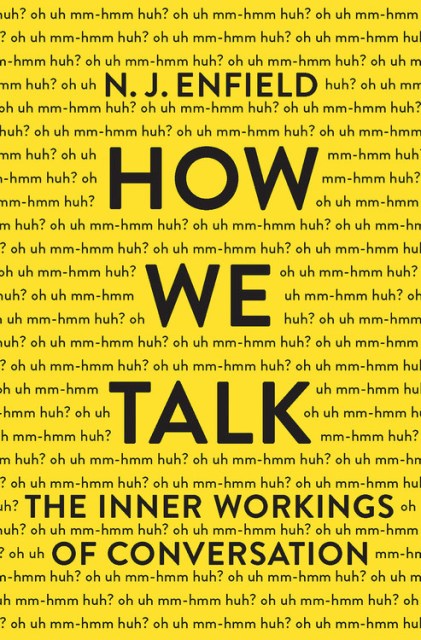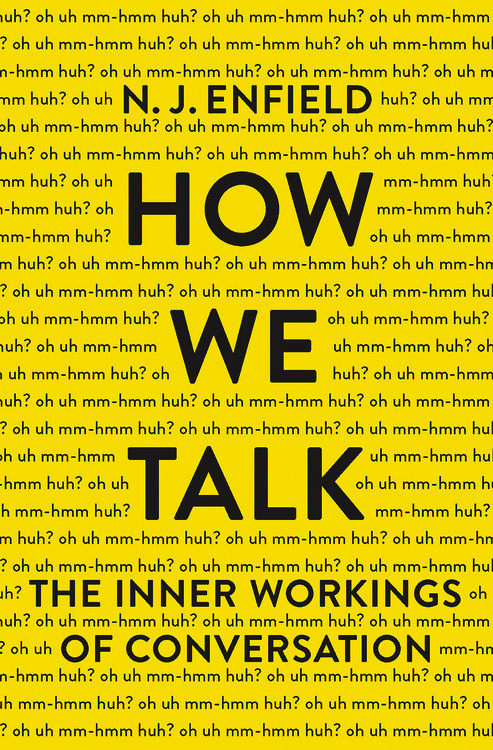How We Talk
The Inner Workings of Conversation
Contributors
Buy from Other Retailers:
- On Sale
- Nov 14, 2017
- Page Count
- 272 pages
- Publisher
- Basic Books
- ISBN-13
- 9780465059942
We all had teachers who scolded us over the use of um, uh-huh, oh, like, and mm-hmm. But as linguist N. J. Enfield reveals in How We Talk, these “bad words” are fundamental to language.Whether we are speaking with the clerk at the store, our boss, or our spouse, language is dependent on things as commonplace as a rising tone of voice, an apparently meaningless word, or a glance — signals so small that we hardly pay them any conscious attention. Nevertheless, they are the essence of how we speak. From the traffic signals of speech to the importance of um, How We Talk revolutionizes our understanding of conversation. In the process, Enfield reveals what makes language universally — and uniquely — human.
Genre:
-
"[Enfield's] sparkling book, How We Talk, sets out to show that the power of the 'conversation machine' is as astonishing as any of our grammatical achievements, and that how we direct our fast-paced exchanges challenges how we think about human nature."New Scientist
-
"Enfield's overall understanding of conversation is unexpectedly moving."New York Times Book Review
-
"Has anyone--a parent, teacher, or boss--told you to purge the words 'um' and 'uh' from your conversation?...In How We Talk...Nick Enfield rescues those words (and everyone who uses them) from censure...expos[ing] the fascinating and intricate workings of what he calls the human conversation machine."NPR/13.7: Cosmos & Culture
-
"Enfield opens a window on linguistic dimensions far beyond grammar."Nature
-
"Conversation, it turns out, is a finely tuned machine, as Nick Enfield...suggests in How We Talk...From a certain point of view, what is fascinating about human conversation is not how hard it is, but how we subconsciously co-operate to make it seem easy."Economist
-
"In Enfield's analysis, human conversation across cultures is defined by a social unease that begins to develop after a break of 600 milliseconds or so. One of the primary purposes of ums and ahhs is a kindness to those around us, a fulfilling of a neighborly duty that keeps others from growing worried or disengaged from the social encounter... Persuasive."Washington Free Beacon
-
"Enfield calls for more focus on conversation as a key to understanding 'what makes language possible in our species,' and he does it in clear prose, and with the use of 30-odd graphs and charts."Winnipeg Free Press
-
"What really stays with the reader is the sense of deep compassion with which Enfield approaches and discusses the inner workings of conversations and the underlying reasons for the evolution of language...It is this empathy that leads Enfield to envision the simple norms of conversations (like the expectation of a response) as following a 'moral architecture' that guides our behavior."Down to Earth
-
"An insightful look into the unique nature of human conversation...Make[s] a strong and convincing case as to why conversation is the fundamental and essential place in which the uniquely human aspects of language are to be found...Recommended."Library Journal
-
"Only when people understand the structure of conversations can they understand the grammar of language...Highly recommended."Choice
-
"Enfield makes a solid case for more focus---and fieldwork---on conversation as a key to understanding 'what makes language possible in our species.' He does all this in clear and casually authoritative prose...This survey performs the neat trick of offering enormous amounts of complex material in a format that remains utterly accessible."Publishers Weekly
-
"If you think grammar is all about nouns, verbs, gender and the subjunctive, N.J. Enfield's new book will transform what you think of language as being all about. At heart language is about communicating with others in rapid-fire conversation, and linguists have found that conversation has rules just as sentence-making does. You may have heard that 'mama' and 'papa' are universal words---but Enfield will teach you that 'huh?' is a third one. If you want to feel sophisticated just in being able to have a two minute conversation on the phone, How We Talk is the book for you."John McWhorter, professor of linguistics, Columbia University, and author of The Language Hoax, Words on the Move, and Talking Back, Talking Black
-
"N. J. Enfield is one of the most brilliant, innovative, and insightful researchers to ever work on language as a cultural construct. How We Talk is a superbly readable summary of his and others' work. It is a book that anyone interested in our species, communication, and the delight of learning should read. I loved every page of it."Daniel L. Everett, author of Don't Sleep, There Are Snakes
-
"N. J. Enfield's new book explains how everyday conversation---language we just take for granted---is all at once both ordinary and extraordinary, and how that paradox defines our very humanity. Full of examples that feel familiar, it's nonetheless a book full of surprises, written in a straightforward, friendly style distilled from long experience of making complicated things clear."Michael Adams, provost professor of English, Indiana University at Bloomington, and author of In Praise of Profanity and Slang: The People's Poetry
-
"N.J. Enfield's How We Talk is a delight. The book is not about the grammar, vocabulary, or usage of language, but rather about how we collaborate with each other in everyday conversation. Enfield's topics range from taking turns, forestalling delays, and assuring mutual understanding, to features of talk that are universal and play a role in the evolution of language. Enfield and his colleagues have investigated everyday talk in languages, both major and minor, from every corner of the world, so he is a true authority on these issues. Best of all, he makes these issues come alive for us readers."Herbert H. Clark, Albert Ray Lang Professor of Psychology Emeritus, Stanford University
Formats and Prices
Price
$36.00Price
$46.00 CADFormat
Format:
- Hardcover $36.00 $46.00 CAD
- ebook $16.99 $21.99 CAD







